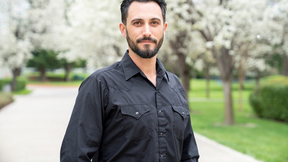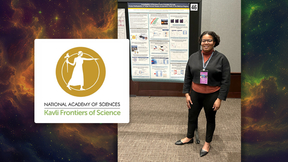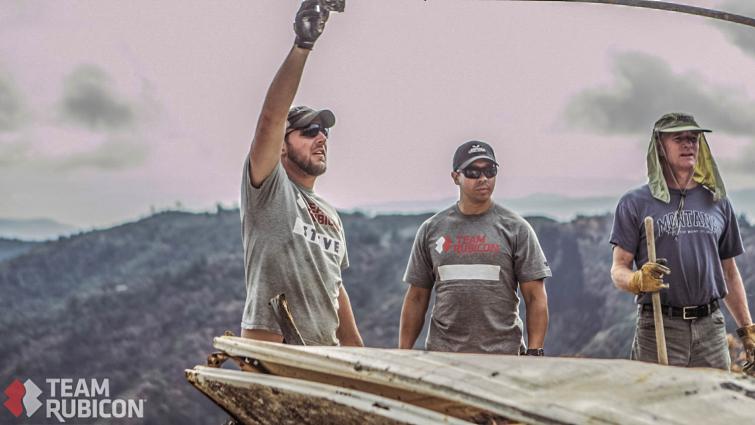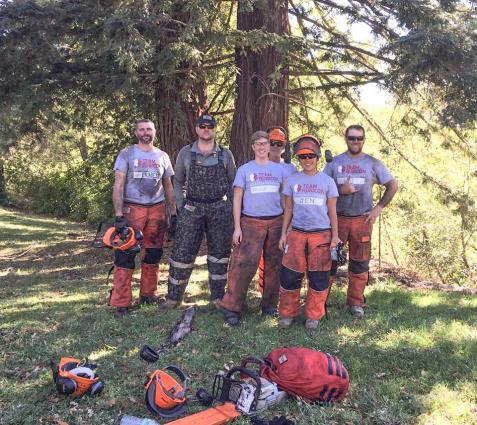Lab employee and veteran Steve Leahy volunteers to help disaster victims rebuild
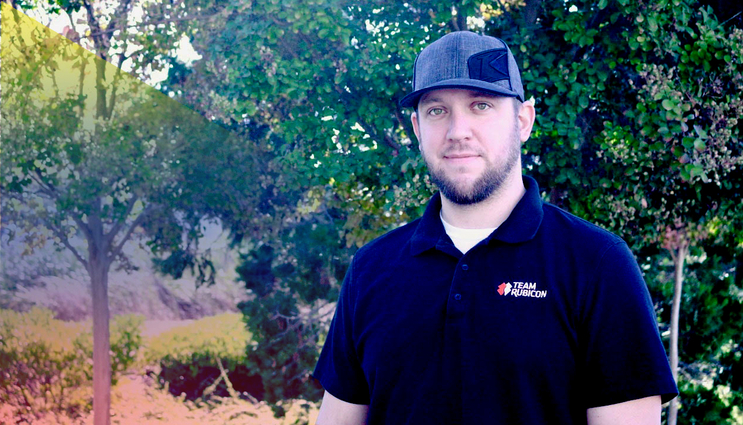 (Download Image)
Lab employee Steve Leahy volunteers to help disaster victims rebuild.
(Download Image)
Lab employee Steve Leahy volunteers to help disaster victims rebuild.
Editor's Note: This is one in a series of articles about Lawrence Livermore National Laboratory employees who volunteer for various nonprofit agencies. Many of these agencies are available for employees to donate through the Helping Others More Effectively (HOME) Campaign.
____________
If you ask Steve Leahy where he was after Hurricane Harvey, the deadly and destructive 2017 storm that hit Texas and broke the damage record set by Hurricane Katrina, he’ll answer that he was there, right outside Houston and working shoulder-to-shoulder with an Australian firefighter, clearing out flooded houses.
At the Lawrence Livermore National Laboratory (LLNL), Leahy is a mechanical technologist, splitting his time between the pulse power group in the National Security Engineering Division (NSED) and the ground-penetrating radar group in Global Security (GS). But as a both a Marine Corps veteran and a volunteer for Team Rubicon, he wears many more hats than just "Lab employee."
Team Rubicon was founded by two Marine Corps veterans after the 2010 earthquake in Haiti, and its mission is to pair the skills and experiences of military veterans with first responders, medical professionals and technology solutions to provide disaster relief services, both domestically and internationally. The organization has more than 65,000 volunteers, and has international branches in Canada, Australia, Norway and the UK, with more countries slated to come on board in the next year. "In the last 90 days alone we’ve run 19 field operations, deploying almost 1,800 volunteers in the continental U.S., Puerto Rico, Mexico and the island of Dominica," Leahy said.
"I get out and do hands-on work as much as possible," Leahy said, "but I’m also the East Bay district coordinator, responsible for organizing and hosting local events, finding new volunteers and generally being the local Team Rubicon point of contact for anyone in the area." Leahy also is a FEMA-certified team member, so occasionally he finds himself on the command staff for a relief operation, helping to coordinate volunteers and keep things running smoothly for everyone getting their hands dirty. While Team Rubicon primarily stays busy with disaster relief, members of the group also hone their skills and stay sharp by volunteering their time and service to abatement activities, working on fire and flood prevention with tasks such as clearing beetle-killed trees to reduce the density of potential wildfire fuel.
Operating under the tagline "Disasters are our business, veterans are our passion," Team Rubicon gives military veterans like Leahy a sense of purpose and community during and after the transition to civilian life. While the organization’s focus is on veterans, it also consists of a large group of non-veteran volunteers who Leahy says the organization refers to as ‘kick-ass civilians.'
"I struggled with my transition from the military to civilian life after leaving the Marine Corps, like many veterans do," Leahy said, "and it’s difficult to explain how much Team Rubicon’s culture and structure have helped me."
"Team Rubicon offers a lot of what I missed about the military -- a sense of service, challenging work and above all, camaraderie. I’ve laughed and cried with people from all walks of life: veterans who have similar experiences to mine but also people who have a completely different background and can lend a different perspective to situations that like-minded veterans may otherwise completely overlook. I’m passionate about Team Rubicon because of what it’s done for my own emotional well being, and because the positive impact it’s had on me came through positively impacting countless others who have suffered from disasters. It’s like a force multiplier for good."
After the 2016 Loma fire in the Santa Cruz Mountains, Leahy was helping several of the residents who lost everything in the fire clear their home sites of ash and debris so they had the option to rebuild. "We don’t just bring in a bulldozer and assume nothing made it," Leahy said, "We try to find anything that may have survived the disaster." While clearing out a home, Leahy managed to find a decades-old framed photo of one of the residents with her children that had somehow survived the fire unscathed. Leahy recounted that, "When I gave the picture to the owner, she was so overcome by emotion she couldn’t speak. That immense happiness and gratitude, a glimmer of hope in one of her darkest days, just the ability to help start that healing process is something you can’t even begin to describe. And it’s something we see on almost every work site, on almost every operation we run. We get to restore hope and help people take their first steps on the long road to recovery, and that’s a moving experience."
Calling back to that moment in Houston with his newly made Australian friend and fellow Team Rubicon volunteer, Leahy said, "I think he put it best: ‘Team Rubicon is not a zero-sum game. I don’t get out what I put in, but so much more.’ My experiences with this organization have really changed the trajectory of my life after the military. On top of the unique brand of therapy the culture provides, I’ve forged friendships with people from more than a dozen countries, I’ve gained skills and experiences that make me more versatile as an individual and I’ve found a way to continue to serve after the military."
Contact
Maren Hunsberger[email protected]
19254226688
Related Links
Team RubiconTags
CareersCommunity Outreach
HOME Campaign
Featured Articles
